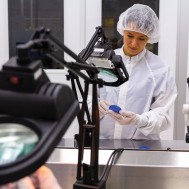The AppleLab® advanced testing laboratory represents Apple Rubber’s commitment to upholding the very highest level of product quality and customer satisfaction that we can.
AppleLab® ensures that our customer’s requirements are always met or surpassed. Through our testing lab, we’re able to offer complete Production Part Approval Process (PPAP), Process Performance Qualification (PPQ), and statistical data to meet your Quality Control requirements. Our unique setup means that we’re able to provide one of the most stringent quality assurance programs in the rubber industry, which we back up through process, material, and dimensional certification, as well as custom documentation to meet all our customer’s specifications.
High Quality = High Tech
Apple Rubber is able to offer custom quality programs upon request to meet our customer’s specific testing requirements. AppleLab® has some of the most sophisticated testing equipment and systems available today. Systems used in our custom testing procedures include:
- Mitutoyo® Quick Vision Measuring System – This non-contact measuring equipment uses the latest optical, video and image processing technologies to accurately measure parts without distortion. Measures even the most demanding microminiature parts quickly and accurately and provides statistical process control data.
- FTIR (Fourier Transform Infrared Spectrophotometer) – This determines chemical make-up of rubber compounds both before and after molding, in a matter of minutes. This ensures the consistency of rubber compounds and seals batch to batch, shipment to shipment.
- Thermogravimetric Analyzer (TGA) – This accurately determines the relative chemical content of materials and their thermal stability at temperatures up to 1,000°C. Completely computer controlled, the TGA delivers unequaled accuracy for material analysis.
- ASTM D1171 – This equipment is used for Ozone Testing
AppleLab® features a wide variety of other specialized equipment to perform a range of tests on seals such as:
- Tensile strength
- Elongation
- Modulus of elasticity
- Specific gravity
- Swell
- Mettler Analytical Balance – Determines the density of rubber compounds per ASTM Method D297
- (2) MTS Tensile Testers – Determines physical properties of cured rubber compounds per ASTM Method D412
- Tech Pro Tensitech 3 Pull Station – Determines physical properties of cured rubber compounds
- Mittutoyo Optical Comparator – Determines certain dimensional characteristics of various molded rubber products
- Micro-Vu Vision Measuring Machine – Verifies dimensional characteristics of rubber molded products and molds
- Mittutoyo Surface Roughness Tester – Determines surface finish on metal products prior to molding rubber to them
- Shore and Rex Durometer Testers – We have both hand-held and table top testers – Type A for measurement to ASTM D2240 and table top Type M for testing cured rubber of slabs and molded products
- Perkin Elmer FTIR – Used for determining chemical properties of rubber compounds both before and after molding
- Alpha Technologies Production Process Analyzer PPA 2000 – Used to evaluate characteristics of raw material, their vulcanization processes, and their post-vulcanization properties.
- Mast Ozone Test Chamber – ASTM D518, D1171, D1149 Ozone cracking and resistance surface, ozone cracking resistance in a laboratory chamber
- Environtronics Temp/Humidity Chamber – ASTM F1087 – stability of gasket material to linear dimensional change due to hygroscopic expansion/contraction test
- TA Instruments TGA – Thermogravimetric Analyzer – Temperature analysis of rubber compounds for both research and quality control purposes including composition and consistency
- TA Instruments DSC – Differential Scanning Calorimeter – Measurement of temperature and heat flow associated with transition points in materials as a function of time and temperature
- Benz Brittleness Tester – ASTM D2137 – Determine the brittle point of rubber compounds
- ScienTemp Freezer – Cold bend testing of rubber compounds for military applications
- Basler Autogage – Verifies dimensional characteristics of rubber molded parts
ASTM Testing Methods
In order to provide guidance in the selection of rubber materials, the Society of Automotive Engineers (SAE) and the American Society for Testing and Materials (ASTM) established ASTM D2000. One of the most versatile and complex specifications in the rubber industry, ASTM means that engineers have a readily available classification system for elastomer compounds. Below are the ASTM testing methods we offer through AppleLab®:
- ASTM D395 – Compression Set Test, Rubber Products
- ASTM D412 – Tension Properties of Vulcanized Thermostat Rubbers and Thermoplastic Elastomers
- ASTM D471 – Volume Change, Effects of Liquid Test
- ASTM D573 – Deterioration in an Air Oven
- ASTM D624 – Tear Strength of Conventional Vulcanized Rubber and Thermoplastic Elastomers
- ASTM D865 – Deterioration by Heating in Air
- ASTM D1414 – Complete Testing of O-rings
- ASTM D2137 – Brittleness Temperature – Low – Used to Find the Brittleness Point of Flexible Polymers
- ASTM D2240 – Durometer Hardness
Questions about Apple Rubber’s testing lab?
Get in touch with one of our engineers today!
